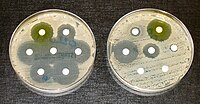
Impact of urban sewage sludge on soil physico-chemical properties and phytotoxicity as influenced by soil texture and reuse conditions.
Sign Up to like & getrecommendations! Published in 2020 at "Journal of environmental quality"
DOI: 10.1002/jeq2.20093
Abstract: Urban sewage sludge (USS) is increasingly applied to agricultural soils, but mixed results have been reported because of variations in reuse conditions. Most field trials have been conducted in cropping systems, which conceal intrinsic soil… read more here.
Keywords: soil texture; sewage sludge; sludge; soil ... See more keywords

Repetitive land application of urban sewage sludge: Effect of amendment rates and soil texture on fertility and degradation parameters
Sign Up to like & getrecommendations! Published in 2019 at "CATENA"
DOI: 10.1016/j.catena.2018.08.015
Abstract: Abstract The agricultural reuse of urban sewage sludge in degraded croplands has seen a wide acceptance for biowaste recycling and for the improvement of soil fertility. However, soil degradation and health issues may arise from… read more here.
Keywords: urban sewage; soil; sewage sludge; degradation ... See more keywords

Comparative diversity of microbiomes and Resistomes in beef feedlots, downstream environments and urban sewage influent
Sign Up to like & getrecommendations! Published in 2019 at "BMC Microbiology"
DOI: 10.1186/s12866-019-1548-x
Abstract: BackgroundComparative knowledge of microbiomes and resistomes across environmental interfaces between animal production systems and urban settings is lacking. In this study, we executed a comparative analysis of the microbiota and resistomes of metagenomes from cattle… read more here.
Keywords: resistomes beef; sewage influent; resistance; urban sewage ... See more keywords

Metagenomics of urban sewage identifies an extensively shared antibiotic resistome in China
Sign Up to like & getrecommendations! Published in 2017 at "Microbiome"
DOI: 10.1186/s40168-017-0298-y
Abstract: BackgroundAntibiotic-resistant pathogens are challenging treatment of infections worldwide. Urban sewage is potentially a major conduit for dissemination of antibiotic resistance genes into various environmental compartments. However, the diversity and abundance of such genes in wastewater… read more here.
Keywords: resistome; resistance; extensively shared; urban sewage ... See more keywords

Butyl Benzyl Phthalate in Urban Sewage by Magnetic-Based Immunoassay: Environmental Levels and Risk Assessment
Sign Up to like & getrecommendations! Published in 2022 at "Biosensors"
DOI: 10.3390/bios12010045
Abstract: A magnetic-based immunoassay (MBI) combined with biotin-streptavidin amplification was proposed for butyl benzyl phthalate (BBP) investigation and risk assessment. The values of LOD (limit of detection, IC10) and IC50 were 0.57 ng/mL and 119.61 ng/mL,… read more here.
Keywords: risk; bbp; urban sewage; ecology ... See more keywords